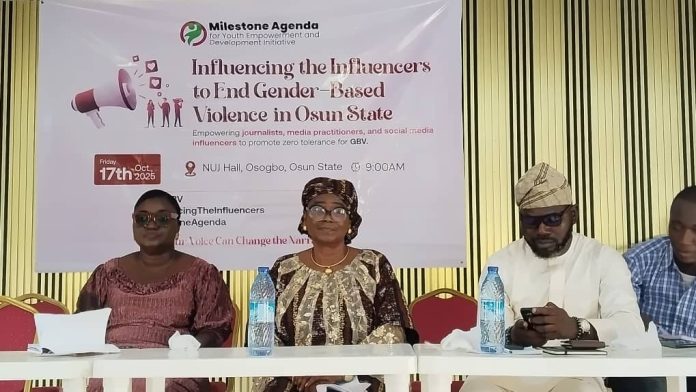A renewed call has been made for journalists and media influencers to take the lead in the fight against gender-based violence (GBV) across Osun State. The call came during a one-day sensitization programme organized by the Milestone Agenda for Youth Empowerment and Development Initiative (MAYEDI) at the NUJ Press Centre, Osogbo, on Friday.
The event, themed “Influencing the Influential to End Gender-Based Violence in Osun State,” brought together journalists, social media advocates, civil society actors, and youth representatives to strengthen collaboration in combating GBV and harmful cultural practices.
In his address, Mr. Ismael Omipidan, Assistant Editor (Politics) at The Sun Newspapers and former Chief Press Secretary to ex-Governor Gboyega Oyetola, emphasized the strategic role of journalists in reshaping narratives and driving change on gender-based issues.
Related Posts:
- Be Apolitical, Maintain Credibility — Adeleke Tells…
- OOPA Celebrates Ismail Omipidan On His 50th Birthday
- UDUS Fact-Check Club Holds Sensitization Program,…
- IWD2024: Top 7 Female Lawmakers Making Waves in Nigeria
- Ilorin Durbar Festival Sparks Debate on Cultural…
Powered by Contextual Related Posts
“From my experience in journalism, cases of child abuse are more rampant in northern Nigeria, where economic hardship often pushes parents to expose their children to exploitation,” Omipidan said.
He shared a story about a philanthropist who withdrew sponsorship for a young girl’s education due to misplaced fears about moral corruption. According to him, this reflects a deep-seated societal misunderstanding that often discourages people from supporting girls’ empowerment.
Omipidan also raised concerns about online harassment, describing Osun as a “hyperactive digital state” where social media could either serve as a tool for enlightenment or destruction. “We must channel technology toward education, advocacy, and responsible communication,” he added.
The veteran journalist urged colleagues to go beyond mere reportage by investigating cases, tracking justice outcomes, and ensuring perpetrators are not shielded by cultural or political connections.
“Many victims of rape or domestic violence rarely speak out due to fear of stigmatization. As journalists, we must give voice to the voiceless and ensure that abusers face justice,” he said.
Also speaking at the event, Mrs. Aduke Obelawo, the Osun State Coordinator of the Inter-African Committee on the Eradication of Harmful Traditional Practices Affecting Women and Children, stressed the need for consistent advocacy and grassroots engagement.
“Gender-based violence is not just a women’s issue, it’s a human rights issue,” Obelawo said. “Our approach must be holistic. Journalists, traditional rulers, faith leaders, and government agencies all have critical roles to play in dismantling the cultural and systemic structures that sustain abuse.”
She noted that the media’s ability to shape public opinion could be harnessed to challenge stereotypes, demand accountability, and encourage survivors to seek justice.
“Every time a journalist reports a case objectively and follows it through, a survivor somewhere gains courage to speak up. That is how societal change begins, one bold story at a time,” Obelawo added.
She further appealed for the inclusion of gender education in school curricula and regular sensitization at the community level to address deeply rooted harmful practices.
Building a united front
Mrs. Bisola Ariwodola, Chairperson of the Osun State Chapter of the Nigeria Association of Women Journalists (NAWOJ), reaffirmed NAWOJ’s commitment to working closely with civil society and government agencies to end GBV.
“This campaign goes beyond awareness — it’s about accountability,” Ariwodola said. “The media must serve as a watchdog, ensuring that no case of abuse is swept under the carpet.”
Participants at the event, including youth advocates and members of various women-led organizations, pledged continued collaboration to ensure victims of gender-based violence receive justice and psychosocial support.
The Milestone Agenda for Youth Empowerment and Development Initiative expressed gratitude to attendees and emphasized that the fight against GBV must remain a collective responsibility.




